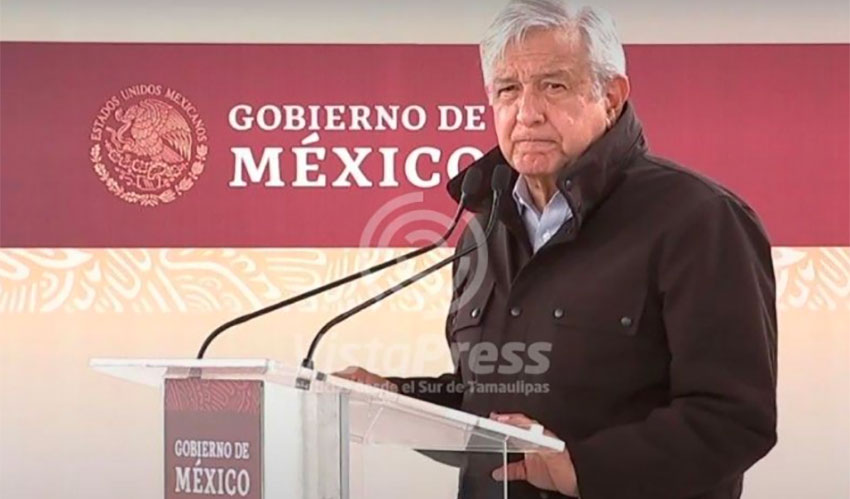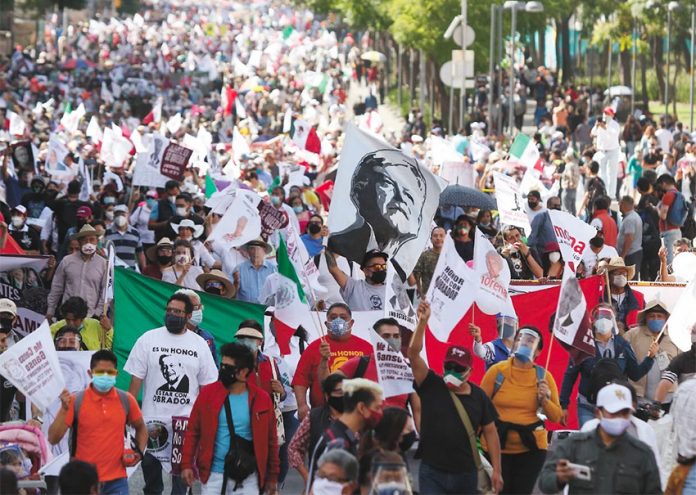About 5,700 people took to the streets of Mexico City on Saturday to show their support for President López Obrador during a march to the capital’s central square.
The procession, a response to recent and ongoing protests by the National Anti-AMLO Front (Frenaaa), was dubbed “the march of a million” by organizers but the number of participants didn’t even reach 1% of that number, according to Mexico City authorities.
Supporters of AMLO, as the president is widely known, came to Mexico City from several states including México state, Hidalgo, Michoacán, Guerrero and Chiapas to participate in Saturday’s march, which left the Angel of Independence monument in the early afternoon.
Chanting pro-AMLO slogans and insults directed at Frenaaa and its leader Gilberto Lozano, the staunch advocates of the president marched along Reforma Avenue before reaching the historic center of Mexico City.
The newspaper El Universal reported that the march was led by a man wearing a López Obrador mask who at one stage removed handcuffs from his pockets and proceeded to “arrest” other participants wearing masks of past presidents Enrique Peña Nieto, Felipe Calderón, Vicente Fox and Carlos Salinas.
The federal government is planning to hold a referendum asking citizens whether recent former presidents should face justice for crimes they allegedly committed while in office.
Upon arriving at the zócalo, the march participants were unable to hide their animosity toward Frenaaa members who have been camping out in the central square since late September, hurling insults at them and telling them to go home.
“Out Frenaaa! The zócalo belongs to everyone,” the AMLO supporters shouted in between chants of “Es un honor estar con Obrador” (it’s an honor to be with Obrador).
The march participants subsequently held a rally in front of the National Palace, which flanks the eastern side of the zócalo, at which they called on the Mexican people to continue supporting the president and declared that they would launch legal action against Lozano, whom they accused of harassing López Obrador supporters.
“We’re not going to allow anything or anybody to stop … this grand national project,” said one of the march organizers referring to the so-called “fourth transformation” the federal government says it is carrying out.
“Let’s all unite for our freedom and democracy and against the [attempted] coup,” Óscar Zurita said.

A day later, López Obrador received a hostile response from Frenaaa members at an event in Nuevo Laredo, Tamaulipas, at which he provided an update on urban improvement projects in the northern border city.
As the president addressed the event, government critics gathered outside the venue, a sports center, repeatedly chanted “López out!” while a group of supporters cheered him on.
With the former attempting to drown him out, the president spoke for fewer than four minutes, asserting that his brevity was due to the coronavirus pandemic.
“I’m going to be brief because there is a lot of passion, a lot of people mobilized here in Nuevo Laredo and we have to take care of ourselves due to the pandemic so that there aren’t infections. … The less time we spend together the better …” López Obrador said.
He told the audience that the government has invested 1.4 billion pesos (US $66.8 million) on infrastructure projects in marginalized neighborhoods of Nuevo Laredo and that it will continue supporting the people of Tamaulipas despite its differences with Governor Francisco García Cabeza de Vaca, one of 10 state leaders who formed a group that is aiming to be a counterbalance to federal power.
“It’s in the public domain that we have differences with the state government but regardless of these differences we have to put the general interest, the interest of the people and the interest of the nation first.”
Speaking before the president, Governor García called on the federal government to make changes to funding arrangements with the states, asserting that Tamaulipas is treated unfairly. He also called on the National Water Commission to ensure that farmers in the northeastern border state aren’t left without water as a result of Mexico’s obligations to the United States under the terms of a 1944 treaty.
López Obrador didn’t address those issues in his brief speech but announcing a water deal with the United States last week said the U.S. had made a commitment to send additional water south of the border in the case of severe drought.
Source: El Universal (sp)
